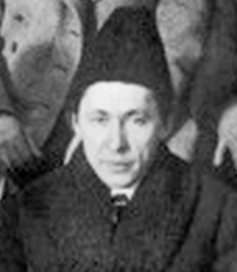Vasily Schmidt
Vasily Vladimirovich Schmidt (Russian: Василий Владимирович Шмидт; December 17, 1886 – July 28, 1938) was a Bolshevik politician, and later a Soviet statesman.
Born in Saint Petersburg to a German Russian working-class family.[1]
He was a member of the Russian Social Democratic Labour Party from 1905.
From February 1917, he became the secretary of the Petrograd Committee of the RSDLP (B) and the Central Council of Trade Unions of Petrograd and a member of the Petrograd Military Revolutionary Committee.

On 1 December 1918, he was appointed People's Commissar for Labour, a post he held until 29 November 1928. The English journalist Arthur Ransome met him soon after his appointment, and described him as "a clean-shaven, intelligent young man, whose attention to business methods is reflected in his Commissariat, which is extremely clean and very well organised." Schmidt told him that the commissariat was "controlled directly by the unions" , and that he was elected to his position by the General Council of Trades Unions.[2] At the same time a member of the Presidium and secretary of the All-Union Central Council of Trade Unions. He was particularly concerned with the statification of the trade unions.[3]
During the Great Purge, he was arrested on January 5, 1937. Convicted on June 3, 1937, to 10 years in prison, on January 28, 1938, he was sentenced to capital punishment and shot on the same day.
Schmidt was rehabilitated on July 30, 1957.
References
[edit]- ^ State power of the USSR. The highest authorities and management and their leaders. 1923-1991 Historical and biographical reference book. / Comp. V.I. Ivkin. Moscow, 1999.
- ^ Ransome, Arthur. Russia in 1919. Project Gutenberg (1998); Arthur Ransome History Archive (marxists.org) 2000. Retrieved 10 April 2021.
- ^ Kaplan (1968) p 255
Bibliography
[edit]- Kaplan, Frederick (1968). Bolshevik Ideology and the Ethics of Soviet labor. Philosophical library, New York.
- Old Bolsheviks
- Deputy heads of government of the Soviet Union
- People's commissars and ministers of the Soviet Union
- Candidates of the Orgburo of the 10th Congress of the Russian Communist Party (Bolsheviks)
- Candidates of the Orgburo of the 14th Congress of the All-Union Communist Party (Bolsheviks)
- Candidates of the Orgburo of the 15th Congress of the All-Union Communist Party (Bolsheviks)
- Members of the Central Committee of the 7th Congress of the Russian Communist Party (Bolsheviks)
- Candidates of the Central Committee of the 8th Congress of the Russian Communist Party (Bolsheviks)
- Candidates of the Central Committee of the 10th Congress of the Russian Communist Party (Bolsheviks)
- Candidates of the Central Committee of the 11th Congress of the Russian Communist Party (Bolsheviks)
- Candidates of the Central Committee of the 13th Congress of the All-Union Communist Party (Bolsheviks)
- Members of the Central Committee of the 14th Congress of the All-Union Communist Party (Bolsheviks)
- Members of the Central Committee of the 15th Congress of the All-Union Communist Party (Bolsheviks)
- Candidates of the Central Committee of the 16th Congress of the All-Union Communist Party (Bolsheviks)
- Russian Constituent Assembly members
- Great Purge victims from Russia
- Politicians from Saint Petersburg
- Russian people of German descent
- 1886 births
- 1938 deaths